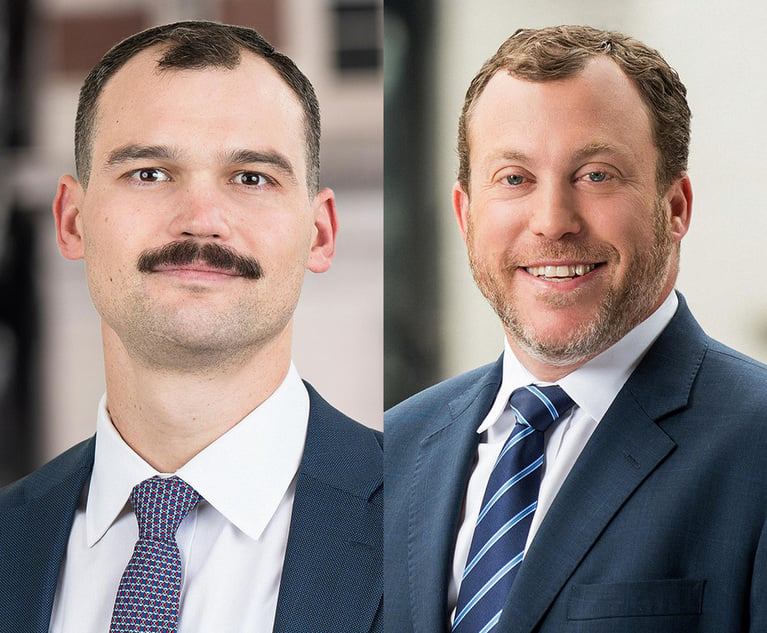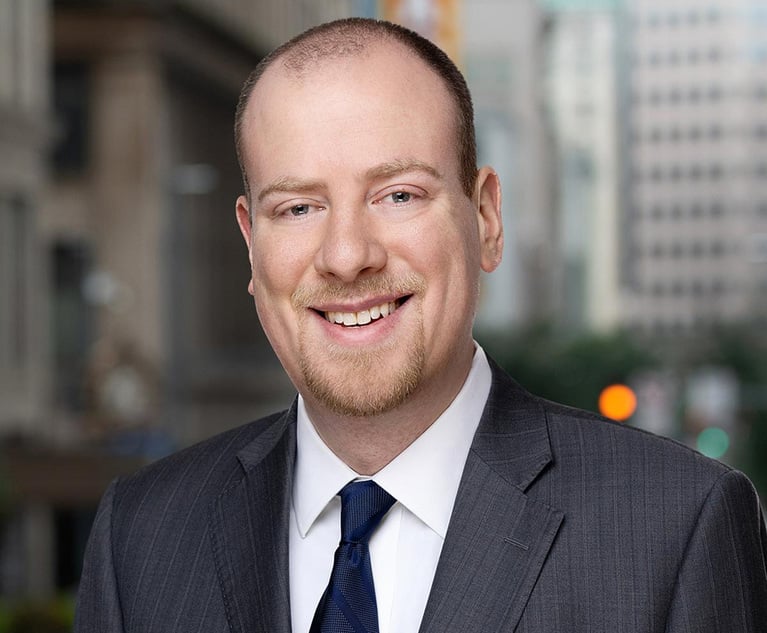 Timothy Lynch, Offit Kurman
Timothy Lynch, Offit Kurman The Grass Is Greener Where You Water It—How to Address Lawyer Turnover, Retention
Most law firms these days are not struggling to find clients or billable work, but they are struggling to find lawyers capable of doing the work and willing to work the hours to meet client demands.
March 07, 2023 at 12:06 PM
8 minute read
Special Sections"Where did all the associates go?" A rather simple question from a colleague at another law firm the last month while we were discussing the state of affairs in the legal industry. She was sharing a sentiment that I have heard from managing partners and hiring partners from all over the country since mid-2021.
Most law firms these days are not struggling to find clients or billable work, but they are struggling to find lawyers capable of doing the work and willing to work the hours to meet client demands. Unemployment rates in the legal industry are hovering around 1.5%. It is a fact that the legal talent is aging and as it ages, the senior lawyers are looking to work fewer hours—not more. Client demands are increasing, yet the available labor pool is not growing sufficiently to meet these needs. One managing partner told me that they have come to accept that this is the new reality for law firms and that it is not going to change any time soon. Many firms simply cannot find qualified lawyers nor keep the talent they have. Because of this two-headed problem, small and midsized firms are considering joining larger firms to address and solve their talent retention/attraction problem.
According to the Bureau of Labor Statistics, the legal industry is expected to grow by 10% in the next 10 years, which is double the expected rate of growth in other industries. So, it is a good time to be a lawyer and it is a good time to be a production lawyer because most firms are looking for talented production attorneys to help solve workflow problems. It should come as no surprise then, that turnover rates generally, and for associates in particular, have increased significantly since 2020. Thomson Reuters reports in its 2022 Report on the State of the Legal Market that associate turnover is approaching 25% and that firms can expect to have more than a 100% turnover in their associate ranks in five years. That is more than double the turnover rate prior to the pandemic.
In the face of a very tight labor market and strong demand for legal services most firms are offering more money to production lawyers to entice them to switch teams. Any number of industry publications cite the desire to get paid more money as the top reason lawyers are increasingly "voting with their feet" and moving to other firms. However, if most firms are paying more money to production lawyers and turnover is still increasing, this lawyer concludes that paying more money to production lawyers may bring them in but is not calculated to enhance retention. It would seem that the old saying that "money can't buy love" is true in the legal industry as well.
A 2022 Thomson Reuters study found that compensation ranked as the fifth most important factor by lawyers who chose not to move to a new firm. Instead, the first four reasons given to "pass on the money" was the environment of the firm, the relationship with their co-workers, the opportunity and support for their advancement, and the firm's genuine regard for their well-being. This survey supports the view that paying more for a lawyer might help get them in the door, but payment of more money alone is not a good retention strategy or is it good for the firms' bottom lines.
The current labor market reminds me of the board game—the Game of Life. In this game, which is essentially a timeline of your life, each player has to make decisions about which path to pursue and each path has a series of milestones impacting family, career and ultimately the ability to win the board game. Making decisions about what firm to join requires lawyers to think about many factors—compensation being but one of them. There are several other factors to consider in deciding which path will lead a lawyer to long-term success and happiness.
Since the end of 2020, too many lawyers are opting to ignore those factors in this labor market and singularly focus on more money. This focus will undoubtedly lead to more turnover. Early in my career, I had a "job" where I was truly unhappy—not with my pay but with the people with whom I worked, and to a lesser extent, the work that I was doing. Thankfully, I quickly came to the conclusion that the firm could not pay me enough to be unhappy. So I found a firm and position where I enjoyed interacting with co-workers, the work I was assigned, and I found an environment supportive of my desire to grow as a lawyer and as a rainmaker. Choosing something in addition to compensation early in my professional career (in my Game of Life) made all the difference for me.
Law firms and their leaders need to look inward and decide what they can do to address the many factors forward-thinking lawyers will consider when deciding to join a new firm or remain where they are. It is clear that today's lawyers want more flexibility about where they work from and when they get their work done. They also want and expect their firms to help them grow and develop business. These wants require law firms to be adaptable and to invest in training and education programs for their lawyers, or risk losing them to competitors. That said, this is not a one-way street. In order to materially grow a book of business, lawyers must be willing to leverage their client relationships by letting other lawyers provide legal services to their clients. This requires lawyers to get to know one other, and to learn each other's strengths to better enable these lawyers to trust one another with their valuable client relationships. Getting to know other professionals requires more than a phone call or a video call. It requires face time, working in an office setting (at times) and by attending social and marketing events with peers. In-person meetings with colleagues (and clients) is a crucial component to a law firm's long-term success at both growth and talent retention. This requires a commitment from lawyers and the law firm. The law firm provides a platform, support, and training opportunities (for both client growth and leadership development) as well as an office environment where lawyers can meet and work together. At the same time, law firms must provide flexibility for the lawyers to find their own work-life balance. The lawyers need to engage with and take advantage of these programs and opportunities. There is another old saying that is applicable here—"if you are not meeting the needs of your customer, someone else will."
Having the right talent in your firm will keep lawyers and clients (both sets of a firm's customers) happy and loyal. There is a pretty simple growth model for success—find good lawyers serving the firm's marketplace and who want to grow their business. All lawyers (and clients) want to work with lawyers doing good work, delivered on time, on budget, and are engaged in the client-attorney relationship.
Recently, I was speaking with an associate at Offit Kurman who decided to remain with the firm despite getting an offer with a higher base pay plan. When I asked her why she decided to stay, she told me she does not think that the grass will always be greener at another firm but rather that the grass will be greener where you water it. She went on to highlight all of the resources and programs that Offit Kurman offers to her, and other lawyers, to help them grow. This was where she focused her internal debate on whether to stay or go. She ultimately decided to remain with a firm focused on making its grass greener for her. Will those other associates who are chasing the "greener" grass do this level of internal debate? Perhaps not. But, firm created training, firm culture, and growth training, will surely be weighed heavily by those forward-looking attorneys at decision time in the Game of Life.
Timothy Lynch is the president of Offit Kurman. As such, he is heavily involved in the daily operations and strategic planning for the firm. Lynch also takes lead on many of the growth initiatives at the firm. He has a national practice that focuses on acting as general counsel and special litigation counsel for entrepreneurs as well as owner-managed businesses and their owners in a wide array of industries. In that regard, he regularly advises clients on strategic, growth and corporate issues. Contact him at [email protected] or 410-209-6436.
NOT FOR REPRINT
© 2025 ALM Global, LLC, All Rights Reserved. Request academic re-use from www.copyright.com. All other uses, submit a request to [email protected]. For more information visit Asset & Logo Licensing.
You Might Like
View All
Pa. Supreme Court to Decide Enforceability of 'Browsewrap' Arbitration Agreements
8 minute read
From a Mediator’s Perspective: Common Mis-steps That Parties Make at Mediation
6 minute readLaw Firms Mentioned
Trending Stories
- 1Uber Files RICO Suit Against Plaintiff-Side Firms Alleging Fraudulent Injury Claims
- 2The Law Firm Disrupted: Scrutinizing the Elephant More Than the Mouse
- 3Inherent Diminished Value Damages Unavailable to 3rd-Party Claimants, Court Says
- 4Pa. Defense Firm Sued by Client Over Ex-Eagles Player's $43.5M Med Mal Win
- 5Losses Mount at Morris Manning, but Departing Ex-Chair Stays Bullish About His Old Firm's Future
Who Got The Work
J. Brugh Lower of Gibbons has entered an appearance for industrial equipment supplier Devco Corporation in a pending trademark infringement lawsuit. The suit, accusing the defendant of selling knock-off Graco products, was filed Dec. 18 in New Jersey District Court by Rivkin Radler on behalf of Graco Inc. and Graco Minnesota. The case, assigned to U.S. District Judge Zahid N. Quraishi, is 3:24-cv-11294, Graco Inc. et al v. Devco Corporation.
Who Got The Work
Rebecca Maller-Stein and Kent A. Yalowitz of Arnold & Porter Kaye Scholer have entered their appearances for Hanaco Venture Capital and its executives, Lior Prosor and David Frankel, in a pending securities lawsuit. The action, filed on Dec. 24 in New York Southern District Court by Zell, Aron & Co. on behalf of Goldeneye Advisors, accuses the defendants of negligently and fraudulently managing the plaintiff's $1 million investment. The case, assigned to U.S. District Judge Vernon S. Broderick, is 1:24-cv-09918, Goldeneye Advisors, LLC v. Hanaco Venture Capital, Ltd. et al.
Who Got The Work
Attorneys from A&O Shearman has stepped in as defense counsel for Toronto-Dominion Bank and other defendants in a pending securities class action. The suit, filed Dec. 11 in New York Southern District Court by Bleichmar Fonti & Auld, accuses the defendants of concealing the bank's 'pervasive' deficiencies in regards to its compliance with the Bank Secrecy Act and the quality of its anti-money laundering controls. The case, assigned to U.S. District Judge Arun Subramanian, is 1:24-cv-09445, Gonzalez v. The Toronto-Dominion Bank et al.
Who Got The Work
Crown Castle International, a Pennsylvania company providing shared communications infrastructure, has turned to Luke D. Wolf of Gordon Rees Scully Mansukhani to fend off a pending breach-of-contract lawsuit. The court action, filed Nov. 25 in Michigan Eastern District Court by Hooper Hathaway PC on behalf of The Town Residences LLC, accuses Crown Castle of failing to transfer approximately $30,000 in utility payments from T-Mobile in breach of a roof-top lease and assignment agreement. The case, assigned to U.S. District Judge Susan K. Declercq, is 2:24-cv-13131, The Town Residences LLC v. T-Mobile US, Inc. et al.
Who Got The Work
Wilfred P. Coronato and Daniel M. Schwartz of McCarter & English have stepped in as defense counsel to Electrolux Home Products Inc. in a pending product liability lawsuit. The court action, filed Nov. 26 in New York Eastern District Court by Poulos Lopiccolo PC and Nagel Rice LLP on behalf of David Stern, alleges that the defendant's refrigerators’ drawers and shelving repeatedly break and fall apart within months after purchase. The case, assigned to U.S. District Judge Joan M. Azrack, is 2:24-cv-08204, Stern v. Electrolux Home Products, Inc.
Featured Firms
Law Offices of Gary Martin Hays & Associates, P.C.
(470) 294-1674
Law Offices of Mark E. Salomone
(857) 444-6468
Smith & Hassler
(713) 739-1250







